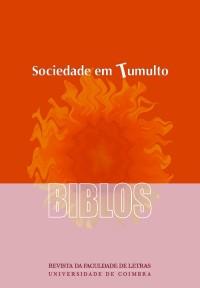Please use this identifier to cite or link to this item:
https://hdl.handle.net/10316.2/32733| DC Field | Value | Language |
|---|---|---|
| dc.contributor.author | Santos, Rosana Baptista dos | - |
| dc.date.accessioned | 2014-07-07T13:59:48Z | |
| dc.date.accessioned | 2020-09-18T09:10:00Z | - |
| dc.date.available | 2014-07-07T13:59:48Z | |
| dc.date.available | 2020-09-18T09:10:00Z | - |
| dc.date.issued | 2009 | - |
| dc.identifier.issn | 0870-4112 | - |
| dc.identifier.uri | https://hdl.handle.net/10316.2/32733 | - |
| dc.description.abstract | The purpose of this article is to analyze the influence of the epic components of war – summarized in the Iliad – on the tale “A inaudita guerra da Avenida Gago Coutinho,” by the Portuguese fiction writer Mário de Carvalho. The author resorts to this ancient literary source, as well as to historical reports about the military conflicts in which Portugal was involved, to create images and stratagems of fantastic wars, which are a recurring theme in his work. | eng |
| dc.description.abstract | O objetivo desse artigo é analisar a influência dos componentes épicos da guerra - sintetizados na Ilíada - no conto A inaudita guerra da Avenida Gago Coutinho, do ficcionista português Mário de Carvalho. É a essa fonte literária arcaica - bem como, num pólo distante de influência, aos relatos históricos sobre os conflitos militares nos quais Portugal se envolveu -, que o autor recorre para compor as imagens e estratagemas de guerras fantásticas, tema recorrente em sua obra. | por |
| dc.language.iso | por | - |
| dc.publisher | Faculdade de Letras da Universidade de Coimbra | - |
| dc.subject | Greek classical tradition | eng |
| dc.subject | epic | eng |
| dc.subject | short story | eng |
| dc.subject | anachronism | eng |
| dc.subject | fiction | eng |
| dc.subject | tradição clássica grega | por |
| dc.subject | épica | por |
| dc.subject | conto | por |
| dc.subject | anacronismo | por |
| dc.subject | ficção | por |
| dc.title | O motivo da ‘guerra’ na Ilíada e em A inaudita guerra da Avenida Gago Coutinho de Mário de Carvalho | por |
| dc.type | article | - |
| uc.publication.collection | Biblos vol. VII | - |
| uc.publication.firstPage | 171 | - |
| uc.publication.lastPage | 194 | - |
| uc.publication.location | Coimbra | - |
| uc.publication.journalTitle | Biblos | - |
| uc.publication.volume | 7 | por |
| dc.identifier.doi | 10.14195/0870-4112_7_8 | - |
| uc.publication.section | Artigos | - |
| uc.publication.digCollection | IP | - |
| uc.publication.digCollection | B1 | - |
| uc.publication.orderno | 8 | - |
| uc.publication.area | Artes e Humanidades | - |
| uc.publication.manifest | https://dl.uc.pt/json/iiif/10316.2/32733/218182/manifest?manifest=/json/iiif/10316.2/32733/218182/manifest | - |
| uc.publication.thumbnail | https://dl.uc.pt/retrieve/11291021 | - |
| uc.itemId | 71764 | - |
| uc.thumbnail.uri | https://dl.uc.pt/iiif-imgsrv/11290971/dl!3!15!69!60!156960992500515956599590901133479158103 | - |
| item.grantfulltext | open | - |
| item.fulltext | With Fulltext | - |
| Appears in Collections: | Biblos | |
Files in This Item:
| File | Description | Size | Format | |
|---|---|---|---|---|
| biblosvii_artigo8.pdf | 610.63 kB | Adobe PDF |  |
Items in DSpace are protected by copyright, with all rights reserved, unless otherwise indicated.
